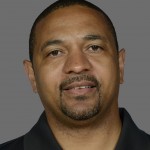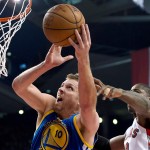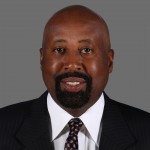 Mark Jackson is the coach of the Golden State Warriors. If you ask him, though, he will probably tell you that he is, first and foremost, a pastor.
Mark Jackson is the coach of the Golden State Warriors. If you ask him, though, he will probably tell you that he is, first and foremost, a pastor.
Generally speaking, Jackson is a good man. He respects all of his players and treats them as equals. He would never speak ill towards any of them and never utters a curse word – not easy to do when you’re involved with the game of basketball.
So it came off as rather surprising when he responded to a question I figured he’d probably never address: what trading former Warriors player Monta Ellis for Andrew Bogut meant for the franchise, from Scott Howard-Cooper of NBA.com:
Warriors coach Mark Jackson with a hard takedown of Monta Ellis. Jackson was asked Thursday how trading Ellis to…
the Bucks in March 2012 not only brought Andrew Bogut in return as the inside presence the Warriors had long desired but also created a clear path for Klay Thompson to blossom at shooting guard.Jackson’s response:
“It helped change the culture. Obviously it was easier to pull the trigger because we knew what we had in Klay and it was time for him to be a starting two-guard. And he does everything right.”
How did that trade change the culture?
Jackson paused four seconds.
“It helped change the culture,” he finally said.
Anything specific?
“You know.”
It wasn’t just about acquiring Bogut or developing Thompson, in other words. It was about atmosphere.
We all know what Jackson said is true. A backcourt of Stephen Curry and Monta Ellis – as Ellis so eloquently pointed out in Curry’s rookie season – was never going to work. They’re too small and both too ball dominant to build a championship-caliber team around. Defensively, it was going to be a struggle every night. Losing Ellis meant the opportunity for both Curry and Thompson to shine. Losing Ellis meant gaining Bogut’s defensive presence – something the team perhaps never had (unless you want to count Erick Dampier’s contract-year stint). Losing Ellis meant getting bigger by default. The decision to move Ellis meant everything for the franchise.
It’s just surprising to hear Jackson admit to it. He’s a smart man, and knows all of these things already in his mind. He knew it the moment the trade was made – that better times were ahead. But he’s also the same man that came in as a rookie coach and praised the idea of Ellis and Curry together. He pleaded that Ellis should have been an All-Star. Whether he truly believed the things he said or not, he still said them. So to hear Jackson admit that Ellis was essentially the virus that the team needed to clean out? It’s the ultimate surprise and validation of the changes that needed to take place for the team to be where it is now.
 Now the question is, when will he get to say the same about David Lee?
Now the question is, when will he get to say the same about David Lee?
Heading into the playoffs, I expected Lee to be badly exposed as a player of many limitations. He can’t defend in any shape or form, he has a hard time finishing on the catch (rather important when you’re playing with Curry), and generally struggles to score against tough players (i.e. Zach Randolph) or players with length (i.e. Tim Duncan and JaVale McGee). When he got injured after the first game of the playoffs, he was saved from scrutiny. Or was he? Check out what Tim Kawakami of Mercury News had to say about Lee’s absence:
It’s quantifiable, it’s palpable and it’s only deniable if you view all things through the prism of David Lee’s All-Star reputation.
It’s a real thing, though: The Warriors are a more dangerous playoff team without Lee than they ever were when he was healthy.
OK, let me also point out that Lee was absolutely necessary during the regular season when Andrew Bogut was out or limited and the team’s younger players were playing young.
The Warriors don’t win 47 games without him, his work ethic, his ability to pile up double-digit rebounds and points (the much-publicized “double-double”) and his true vocal leadership.
But at this advanced stage of Warriors activity—tied 1-1 with the Spurs in the Western Conference semifinals—there just isn’t much doubt that Lee’s torn hip-flexor in Game 1 of the first round hasn’t hurt them.
It freed the Warriors to be more of who they truly should be, actually.
They’re faster, more flexible, more aggressive, tougher, more balanced, better on defense and now they’re built around a powerful three-piece axis:
It’s harder to say bad things about Lee because of who he is: a good, positive character who never causes trouble in the lockerroom. He simply goes about his business and does the best he can with the talents he has. Still, truth is truth, and the fact that the Warriors are better without him has to be emphasized. He is not a good fit for what Golden State has become, and it will be interesting to see how management decides to go about the situation beyond this season.
Onto other news from around the league:
 Mike Woodson will not hesitate to pull struggling J.R. Smith out of the game if he continues to underwhelm, from Marc Berman of New York Post: “Mike Woodson’s patience is running thin with J.R. Smith. For the first time, the Knicks coach said he will have a quicker hook with the Sixth Man Award winner if his shooting woes continue. Smith’s jump shot has been in the gutter since returning in Game 5 of the first round against Boston after serving a one-game suspension for elbowing Jason Terry. “If he’s struggling and I feel the need, I got to pull him,” Woodson said on his ESPN Radio show yesterday. “I will do that as head coach.” Following Tuesday’s victory over Indiana in Game 2 of the Eastern Conference semifinals, Smith admitted, “My shot is lost for now.’’
Mike Woodson will not hesitate to pull struggling J.R. Smith out of the game if he continues to underwhelm, from Marc Berman of New York Post: “Mike Woodson’s patience is running thin with J.R. Smith. For the first time, the Knicks coach said he will have a quicker hook with the Sixth Man Award winner if his shooting woes continue. Smith’s jump shot has been in the gutter since returning in Game 5 of the first round against Boston after serving a one-game suspension for elbowing Jason Terry. “If he’s struggling and I feel the need, I got to pull him,” Woodson said on his ESPN Radio show yesterday. “I will do that as head coach.” Following Tuesday’s victory over Indiana in Game 2 of the Eastern Conference semifinals, Smith admitted, “My shot is lost for now.’’
I would take anything that Kawakami has to say about David Lee with a grain of salt. He has been a known Lee hater for years.
I know this, but what he’s saying right now are facts. If he’s saying stuff without substance, I’d never promote it.
What Kawakami is saying is speculative. Isn’t there just as much reason to think they would have taken game 1 had they another body as capable as Lee down the stretch as there is to think that their success is in part due to Lee’s absence? I.E. we can only speculate on what his absence means, and to ignore the positive appears biased, a la Kawakami. At the very least to say that it is factual is a stretch. We would have to not only judge the Warriors at their best, but also at their worst, and, in my opinion, without Lee their worst is worse than it is with him…